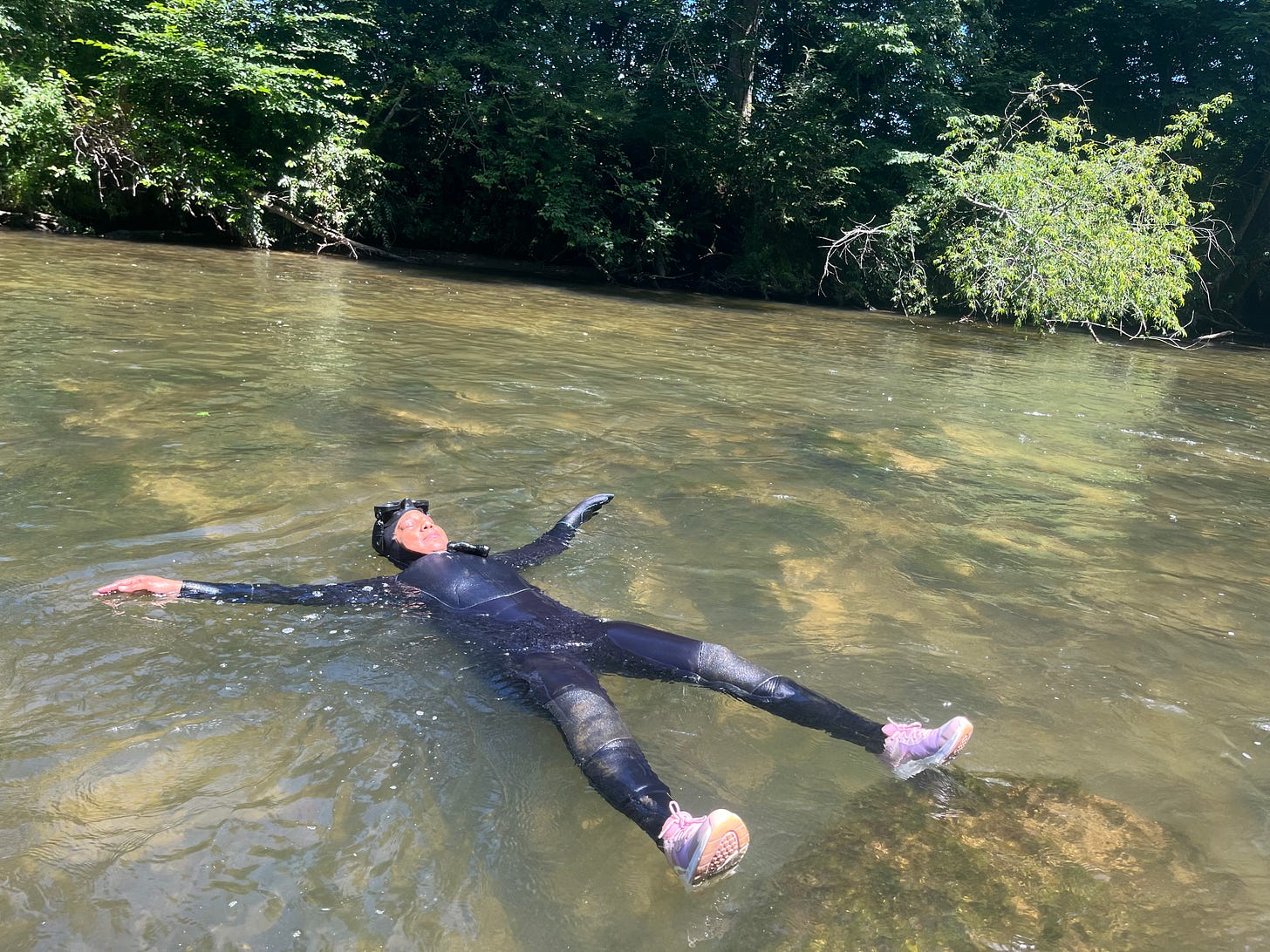ASHEVILLE, N.C. — I’m a planner. But the best part of my trip to Asheville was an impromptu, add-on adventure.
I met a leech.
I was in town for a workshop and all week locals offered up the city’s hospitality.
They said: “Go to HomeGrown, the catfish is amazing.” It was, but I liked the sautéed sesame greens the best.
They said: “Check out the story slam at The Grey Eagle. The storytellers were the usual mix of moderately entertaining to heart-rending.
They said: “You know about the snorkel trail, right?”
Snorkel, what?
Snorkel Trail.
Nope, new to me.
The Blue Ridge Snorkel Trail is a list of places with public access to local rivers, plus a tip sheet listing the wildlife you might see once you get your face wet.
It’s free. Swimmers more confident than me could go on their own with a buddy and some basic snorkel gear. But I’m nervous in cold water and I wanted help ID-ing the native animals and plants, so we booked a guide and opted for full wetsuits. The aquatic specialist knew where to go and the best times to experience North Carolina’s crystal-clear mountain waters.
The French Broad
After wading into the French Broad River, we shuffled along in search of a spot deep enough to flop down onto our bellies. (You definitely need sneakers to protect your feet from the rocky riverbed.)
For the first half hour, I didn’t see anything. I couldn’t get comfortable in the mask and struggled to discharge the water that kept seeping into my mouthpiece. I was also battling a feeling I later learned is called “immersion diuresis.” That’s when the shock of cold water sends signals to your kidneys to get to work.
I did not win the battle.
Once I was breathing easier, the fish came into focus.
An orange streak. Then another one. And another.
Not quite a school, but definitely a classroom of tangerine darters playing in the riffles.
The males were about 5 inches long with red-orange bellies. The females are golden with a sprinkling of spots along the top.
My camera and I weren’t fast enough to catch a picture, but you can see a close up of a tangerine darter here.
RIFFLES a perfect word for the shallow places where water flows quickly past rocks.
Darters eat mayflies and that helps control the population, which many of us humans consider pesky. Seeing tangerine darters is a great sign for river health. How? TL;DR — Darters help freshwater mussels grow. Mussels help keep rivers clean.
Mussels are filter feeders and suck up pollutants. As adults, they don’t move around much, but once a mother releases her glochidia (baby mussels!), the offspring hitch a ride — like the parasites they are — to new frontiers on the gills and fins of fish. Darters are like a kiddie car service for mussel larvae. Here’s an explainer from biologist Anna George, vice president of conservation science and education at the Tennessee Aquarium.
Meet Huri
My buddy Rene spotted them first: a leech stuck to a rock – waving at us. Kind of.
A leech is a segmented worm. I can’t confirm that one’s preferred pronouns, but Hirudinea have both male and female reproductive organs, so I’m going with them/they. I named them Huri. Science purists hate it when newbie naturalists, like me, give non-human characteristics to wild animals. But this time, respectfully: Kick (river) rocks.
The one we found was a shapeshifter. Huri was blobby and flat at first, then stretched thin, seeming to lift up and look around. Maybe as curious about us as we were about them.
Freshwater leeches mostly live in still or slow-moving water, so it was unusual to spot one in the swift moving French Broad.
When we confirmed the leech was a leech, I expected that name to trigger some innate (probably just learned) revulsion in me. Sure, I’m an environmental educator and I’m supposed to be a steward of all things wild. But naturalist or not, all maggots, every cockroach and any mouse that makes its way into my home has a place on my personal disgust list.
I thought leeches were on the list too. That was before I met Huri.
Once you’ve shared a moment together in river water — and a trickle of urine — it’s hard to hold on to hate.
Despite your best efforts to love all animalkind, who’s on your personal disgust list? Leave a comment or drop an emoji.

Next week …
There’s a Picture Book for That








